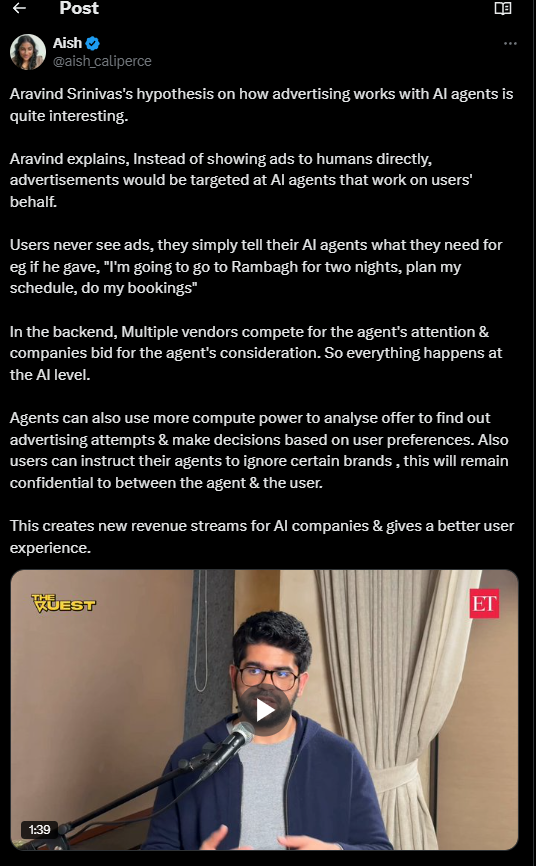Advertising in a Post AI World
Aravind Srinivas (Perplexity) recently talked about how advertising might work in a future dominated by AI. His vision? A world where we never see ads because our AI agents handle them all behind the scenes. Sounds neat, but I’m not entirely convinced.

Here’s the thing. What Aravind describes isn’t really advertising. It’s more like super powered comparison shopping.
Taking his example of “Book me two nights at Rambagh”, the “human” equivalent of this is a human agent (Either yourself or a physical agent). One who goes to let’s say MakeMyTrip, or Google Flights, or Booking/Agoda/Airbnb etc to see and compare deals and then booking the best one. Maybe the human agent will also take decisions around the location, and the view, and the services/reviews besides just the cost to make it a well rounded decision. But essentially, this is a filtering of offers, not advertising.
An AI agent would replace this manual process into an automated deal hunting, albeit a very sophisticated version of it.
Real advertising is something entirely different. It’s not just about showing you the best price or the most relevant option. It’s about creating desire, building an emotional connection, and sometimes (many times, rather) even making you want things that you don’t need, or ever knew that you wanted.
This is basically psychology (advertising) vs logistics (AI deal hunting)
Before we move on, we should also talk about Sponsored listings. This is where you see someone paying to show up in the top results when you search for a hotel. We might say that this is a form of advertising that shows up often in search results and deal hunting. I agree that this might still exist, but I think in a post AI world this becomes likely less important where there is enough compute available to the AI agent to sift through 1000s of results without having someone to show up in the “top” results
Now, if anything, I believe traditional advertising (not talking about the formats and channels here) might become even more prevalent in an AI-powered future. Think about it - If AI handles more and more of our mundane tasks, we have more leisure time left to ourselves. More time to consume media, more time to explore new experiences, and yes, more time to be influenced by advertising.
Just look at any sci-fi depictions of the future - from Blade Runner to Cyberpunk 2077. They all show cities plastered with advertisements, and there’s a reason for that.
Sure, my AI assistant might be great at finding me the best hotel deal or the most efficient flight route. But can it decide what makes me feel good? Some might say that with extreme personalization and increasing compute, it can use those as parameters as well. But I think even for that the user would be feeding in that information to the agent. The agent cannot experience the emotional pull of a well-crafted marketing campaign, or be charmed by clever branding or moved by a powerful story.
This does not mean AI has no place in advertising. It’s already a big part of today’s advertising and will continue to grow. Advertisers do (and will continue to) use AI to learn more patterns about human behavior, optimizing their campaigns and reach, but the goal would still be to speak to human hearts and minds. Convincing an AI agent running calculations in the background would be a side effect.
That’s why I think Aravind’s vision, while interesting, misses a crucial point about what advertising really is. The future of advertising isn’t about eliminating human involvement - it’s about finding new ways to connect with humans who will have more time and attention to spare.